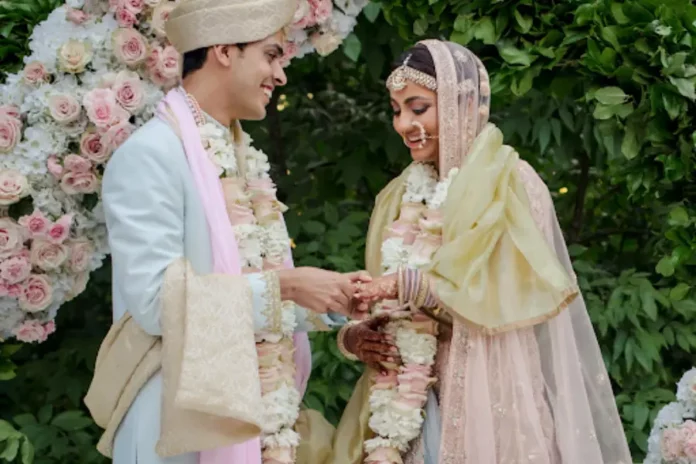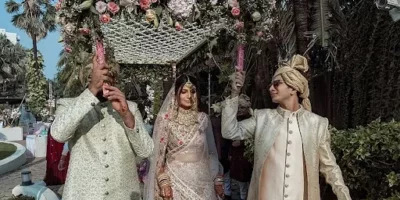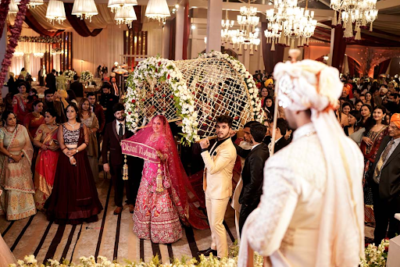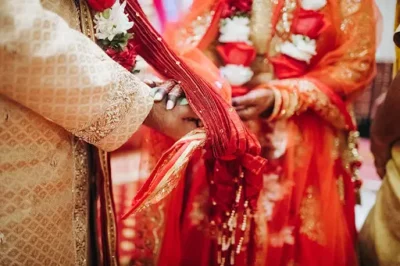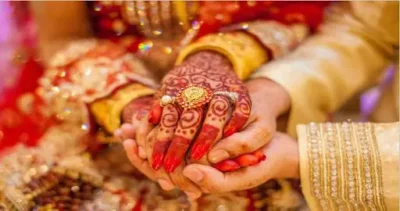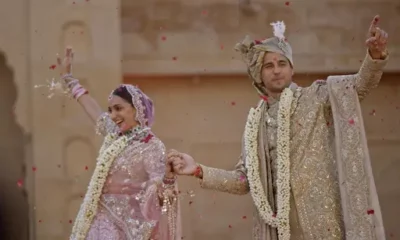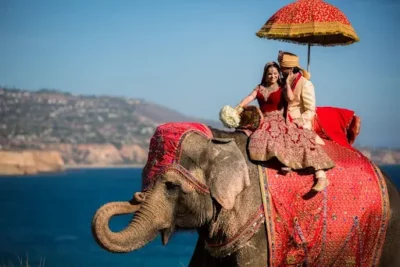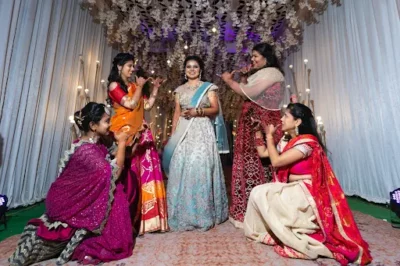Planning an Indian wedding is like orchestrating a grand symphony of emotions, traditions, and celebrations. With its rich cultural tapestry, a typical Indian wedding is a multi-day affair that weaves together rituals, ceremonies, and festivities. But to ensure that this tapestry unfolds seamlessly and leaves lasting memories, you need a well-structured wedding timeline.
A wedding timeline is your blueprint for the perfect celebration. It’s your guide to navigating the labyrinth of events, and if done right, it can ensure a smooth and enjoyable experience for you, your family, and your guests. In this blog, we’ll delve into the art of crafting a wedding timeline that not only accounts for the rich traditions but also keeps everyone engaged, entertained, and stress-free. So, let’s embark on this journey to create a memorable Indian wedding celebration!
-
Start Early: The Foundation of a Great Timeline
The journey towards a perfect wedding timeline begins long before the big day. In the early stages of wedding planning, set aside time to outline your vision for the celebration. Think about your priorities and what elements of the wedding are most important to you. This initial introspection will help you lay the foundation for a well-structured timeline.
Why Starting Early Matters
Starting early gives you the advantage of having more choices and flexibility when it comes to selecting venues, vendors, and dates. It also allows you to book in-demand professionals, ensuring that you get the best services for your special day. Moreover, beginning the planning process ahead of time helps you manage stress and make informed decisions.
-
Consult with Experts: The Wedding Planner’s Touch
Consider enlisting the help of a professional wedding planner. An experienced wedding planner can be an invaluable resource in crafting a timeline that not only flows smoothly but also captures the essence of your dream wedding.
The Benefits of Hiring a Wedding Planner
A wedding planner can provide you with expert guidance on every aspect of the timeline, from the ceremony order to the entertainment schedule. They can help you stay within your budget, negotiate with vendors, and ensure that all logistical details are taken care of. Most importantly, a wedding planner can save you precious time and alleviate stress, allowing you to fully enjoy the planning process and the big day itself.
-
Traditional vs. Modern: Balancing Traditions and Personalization
Indian weddings are a beautiful amalgamation of tradition and modernity. Balancing these two elements in your wedding timeline is crucial to ensure that your celebration feels both authentic and uniquely yours.
Embracing Tradition
Start by identifying the key traditions and rituals that hold significance for your family and culture. These might include ceremonies like the Mehendi, Sangeet, or Baraat. Make sure to allocate ample time for these rituals, as they often form the emotional heart of the wedding.
Adding Personal Touches
Modern Indian weddings often include personalized elements such as custom vows, fusion music, and creative decor. These personal touches add a unique flavor to your celebration. While maintaining tradition is important, don’t be afraid to infuse your personality and style into the timeline to make it truly your own.
-
The Perfect Venue: Timing and Logistics
Choosing the right venue is a pivotal decision in crafting your wedding timeline. Whether it’s a grand banquet hall, a lush outdoor garden, or a destination wedding locale, the venue sets the stage for your celebration.
Venue Selection and Timing
Consider the logistics of your chosen venue. How far is it from your residence or accommodations? Does it have multiple spaces for different ceremonies and functions? Factor in the time required for setup and decoration to ensure that everything runs smoothly on the day of the event.
Weather Considerations
If you’re planning an outdoor event, keep a close eye on the weather forecast for your chosen date. While you can’t control the weather, you can have backup plans in place to ensure that rain or extreme heat doesn’t disrupt your celebration.
-
RSVP and Guest List Management: Avoiding Last-Minute Surprises
Creating a guest list and managing RSVPs is often a challenging task, but it’s essential for constructing a well-organized wedding timeline.
Guest List Management
Start by creating a comprehensive guest list that includes all the important people in your life. This list will help you estimate the number of guests attending each event. Be sure to communicate with your guests well in advance and provide clear instructions for RSVPs to avoid any last-minute surprises.
Seating Arrangements
Once you have a clear idea of the number of guests attending, work on creating seating arrangements for each event. Proper seating ensures that everyone is comfortable and can enjoy the festivities without any hassle.
-
Ceremony Order: The Heart of the Celebration
The core of any Indian wedding is the series of ceremonies and rituals that bring two families together. Planning the order of these ceremonies is essential for a seamless flow.
Traditional Ceremony Order
Typically, Indian weddings begin with the Mehendi ceremony, followed by the Sangeet, Haldi, and other pre-wedding rituals. The main wedding ceremony, which may be a Hindu, Sikh, Muslim, or Christian wedding, is the focal point. Follow this with the reception and any post-wedding rituals.
Customizing the Order
Feel free to customize the order to suit your preferences and the needs of your guests. For example, you might choose to have a reception immediately after the wedding ceremony or opt for a more relaxed schedule with a break in between events.
-
Entertainment: Keeping the Energy High
Entertainment is the lifeblood of any Indian wedding. From live bands to DJs, dance performances to stand-up comedians, your choice of entertainment can make or break the celebration.
Entertainment Choices
Consider the musical and entertainment preferences of your guests. A diverse playlist that includes both traditional and contemporary music can keep everyone engaged and dancing. Live performances, such as a dance troupe or a classical music ensemble, can add a touch of sophistication to your celebration.
Timing is Everything
Plan entertainment slots strategically to maintain a high energy level throughout the event. For instance, consider scheduling dance performances during the Sangeet or after dinner to keep guests entertained.
-
Photography and Videography: Capturing Precious Moments
Your wedding day is a collection of beautiful moments that you’ll want to cherish forever. Hiring a skilled photographer and videographer is essential to capture these memories.
Photographer and Videographer Selection
Choose professionals with experience in Indian weddings, as they understand the nuances of the ceremonies and can capture the emotions and rituals beautifully. Discuss your expectations and the style of photography you prefer.
Photo Sessions
Plan specific time slots for various photo sessions, including candid shots, couple portraits, and family photographs. Ensure that your timeline accommodates these sessions without rushing or missing out on important moments.
-
Food and Beverage: A Gastronomic Experience
Indian weddings are renowned for their sumptuous feasts. Planning the menu and catering logistics is crucial to ensure that your guests enjoy a gastronomic delight.
Menu Planning
Work closely with your caterer to create a diverse and delectable menu that caters to various dietary preferences and restrictions. Traditional dishes, regional specialties, and international options can add depth to your culinary offerings.
Buffet or Sit-Down Dinner
Decide whether you want a buffet-style dinner or a sit-down meal. Buffets are great for offering a wide variety of choices, while sit-down dinners provide a more formal dining experience.
-
Managing Time Buffers: Expecting the Unexpected
No matter how meticulously you plan your wedding timeline, unexpected delays or surprises can happen. It’s essential to build in time buffers to account for these unforeseen circumstances.
The Importance of Buffer Time
Buffer time can help you stay on track even if things don’t go as planned. Whether it’s a late arrival of guests, a wardrobe malfunction, or a sudden rain shower, having extra time in your schedule can prevent stress and chaos.
Communicate with Vendors
Make sure your vendors are aware of the buffer time so that they can adjust their schedules accordingly. Effective communication ensures that everyone is on the same page and can adapt to any unexpected changes.
-
Rehearsal: Practice Makes Perfect
A rehearsal is like a dress rehearsal for your wedding day. It’s an opportunity to iron out any last-minute hiccups and ensure that everyone knows their role in the celebration.
Who Should Attend
Gather your close family members, wedding party, and key vendors for the rehearsal. This includes the priest, if applicable, and anyone involved in the ceremony.
Walk Through the Schedule
During the rehearsal, walk through the entire wedding timeline, from the ceremony processional to the reception exit. This practice run helps everyone understand their cues and timings.
-
Keep Guests Informed: Wedding Itinerary
Create a detailed wedding itinerary and share it with your guests well in advance. An itinerary helps guests know what to expect, where to be, and when.
Wedding Website or App
Consider using a wedding website or app to share the itinerary, along with important information like venue addresses, dress codes, and contact details. This digital approach makes it easy for guests to access information at their convenience.
Printed Itinerary
Additionally, provide printed copies of the itinerary at key points during the celebration, such as at the entrance to the venue or in guest welcome bags. This ensures that even those who may not have checked the digital version are well-informed.
-
Embrace Spontaneity: Enjoying the Moment
While meticulous planning is crucial, it’s also important to leave room for spontaneity and genuine moments of joy.
Savor the Moments
Amidst the hustle and bustle of the wedding day, take a few moments to soak in the atmosphere, appreciate your loved ones, and savor the significance of the occasion.
Trust Your Team
Delegate responsibilities to trusted family members or the wedding planner to handle any last-minute issues. This allows you to stay focused on enjoying the celebration without worrying about the details.
-
Stay Hydrated and Energized
With all the excitement and running around, it’s easy to forget to take care of yourself on your wedding day. Staying hydrated and well-nourished is crucial to ensure you have the energy to enjoy every moment.
Pre-Wedding Nutrition
Start the day with a nutritious breakfast and stay hydrated by sipping water throughout the day. Avoid heavy, greasy foods that might lead to discomfort during the festivities.
Mini Breaks
Take short breaks whenever you can to rest and recharge. These moments of respite can help you stay fresh and energized throughout the celebration.
-
After the Celebration: Gratitude and Reflection
As your wedding day draws to a close, it’s important to express gratitude and reflect on the journey that brought you to this moment.
Thank Your Team
Take time to thank your wedding planner, vendors, family, and friends who played a significant role in making your celebration a success. A heartfelt note or a small token of appreciation goes a long way.
Reflect and Relive
After the wedding, spend time with your partner reflecting on the day’s events. Look through your wedding photos and videos to relive the beautiful moments and emotions you shared.
Conclusion: Crafting Your Perfect Wedding Timeline
Your Indian wedding is a chapter in your life story that you’ll cherish forever. Crafting the perfect wedding timeline ensures that every moment is memorable and flows seamlessly from one event to the next. It’s a symphony of tradition, personalization, and celebration that reflects your love story and cultural heritage.
Remember, the key to a smooth-flowing wedding timeline is careful planning, open communication, and the ability to adapt when necessary. By following these tips and consulting with experts, you’ll be well on your way to creating a wedding timeline that leaves a lasting impression on you, your family, and your guests. So, embrace the journey of planning your Indian wedding with excitement, and may your celebration be a harmonious blend of tradition and modernity, filled with love, laughter, and beautiful memories.





